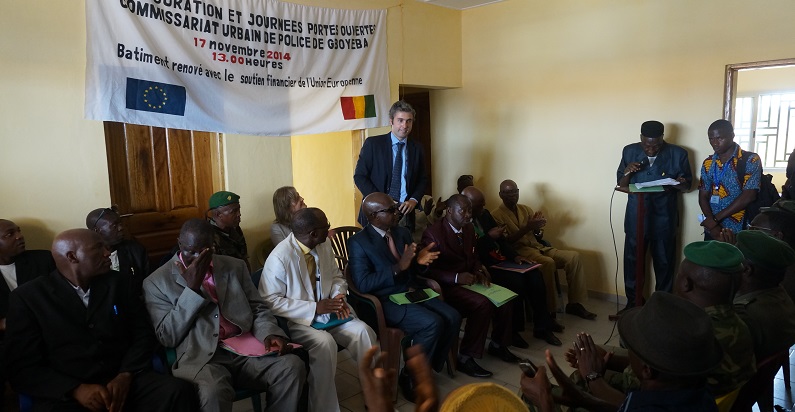-
08 January 2015
Category : Interview
Development worker in Guinea and officer of the National Police
Interview with the Inspector of the National Police Force, Fernando Santos, who spent 14 months in Guinea coordinating a FIIAPP security project

Fernando touched down in Guinea in late 2013 to coordinate a pilot project financed by the European Union and managed by the FIIAPP to restore trust in the National Police on the part of the population of this African country. A trust undermined during the 24 years of the government of the late Lasana Conté. We go over the most important points of this project with Santos, who set foot on Guinean soil without ever imagining that he would have to face the Ebola epidemic in short order. Here is his #CooperationStory
What is objective of the project?
The objective of this EU project was to train and provide support to the Guinean National Police to bring this police force closer to the population. How? Through different activities: training for police officers to enable them to carry out their functions professionally and competently, renovating police stations to make them minimally presentable for registering complaints, jailing detainees, protecting complainants, etc. And another part of the project was dedicated to equipping the police with vehicles, material resources, computers… to allow them to perform their functions with a certain level of competence, considering that the Guinean Police was found to have almost no material resources.
At times you didn’t even have electricity…
Electricity is a general problem in Guinea. It depends on the day, but there are people who hardly have any electricity; others only have it for six or 12 hours… In our pilot police stations, we set up an electrical system using solar panels that enables the police station to have electricity 24 hours a day for charging everything from radios to cell phones and printers…
What is the reason for this mistrust on the part of society?
There was a certain degree of neglect by the government towards the Police. In Guinea, there are two main police forces: the Gendarmerie (the equivalent of the Spanish Civil Guard) and the Police. Let’s just say that the efforts of the government to promote these police forces were focused on the Gendarmerie. So now the new President wants to promote the Police and create a trained police force that can perform basic police work with some guarantees for citizens.
What did Spain contribute in this project?
This was a project led by the French, in which Spain collaborated on two points. The first, the work I was doing in my role as the operational manager in the city of N’Zérékoré. My mission basically was to start up all the activities planned for the project in this city. That is, the training activities, the rebuilding of the police station and the delivery of all the material purchased for the project. The second, the training activities and work done in two areas by some colleagues from the National Police Force and the Civil Guard who travelled to Conakry: the General Inspectorate for Services, which would be the equivalent of ‘Internal Affairs’ in Spain, and gender violence, for which a female inspector gave training courses and established action protocols.
What was done with the three beneficiary police stations in the project?
Two police stations were in Conakry and the other was the one in N’Zérékoré. In the first two cases, reconstruction and expansion was done on the foundations of the old ones. In the case of N’Zérékoré, an old police station building that had been totally destroyed in the general strikes of 2007 was rebuilt.
Is Guinea willing to provide continuity to this pilot project?
Yes, both the EU, which in this case is the organization funding this, and the Republic of Guinea are open to carrying out new projects in the police area. Moreover, it is absolutely necessary because the country is large and this was just a small project. I believe that future EU investment will be quite substantial in order to strengthen the National Police.
And how was it living there for 14 months?
It was a lovely experience. The people of Guinea are very nice, extraordinary. They were very accepting of me… It was a time when the country was being hit by Ebola, and that affected the normal progress of the project and our daily lives because we had to take a series of precautionary measures to avoid infection. But aside from that, which obviously was dramatic, as far as the rest was concerned, it was a marvellous experience.
On our radio program,‘Public cooperation around the world’ (Radio5), you can listen to the experiences of these experts
The author has sole responsibility for the opinions and comments expressed in this blog
The views and opinions expressed in this blog are the sole responsibility of the person who write them.







